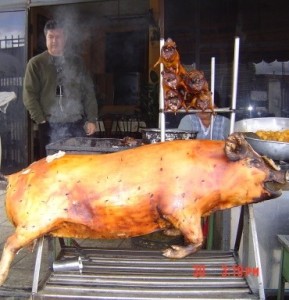On July 15, 2015, the Washington State Department of Health notified the feds of an investigation of Salmonella I 4,[5],12:i:- illnesses. The U.S. Department of Agriculture’s Food Safety Inspection Service (FSIS) determined there was a link between whole hogs for barbeque and pork products from Kapowsin Meats and these illnesses.
 JoNel Aleccia of The Seattle Times writes the oddly named strain of salmonella, common nationally but never before seen in Washington, now has sickened at least 167 people in 11 counties with confirmed illness since April, health officials said.
JoNel Aleccia of The Seattle Times writes the oddly named strain of salmonella, common nationally but never before seen in Washington, now has sickened at least 167 people in 11 counties with confirmed illness since April, health officials said.
People who fell ill consumed whole hogs at private barbecues and at several King County restaurants that served dishes containing the tainted meat. At least 24 people have been hospitalized; several lawsuits have been filed.
Dr. Scott Lindquist, state epidemiologist, wants to knowwhether swine sent to Kapowsin Meats in Graham, Pierce County, were colonized with the strain associated with the outbreak. Officials with the U.S. Department of Agriculture (USDA) issued a public-health alert because of the problem, and Kapowsin has now recalled more than 520,000 pounds of pork products and closed its doors until the issue is resolved.
“What I’m trying to figure out is, did it come from all the farms that fed into Kapowsin? Was this very specific strain in each of those farms, or was it just one? What if all of these farms test negative?” Lindquist said. “It would be helpful for me to know: Are those pigs carrying this specific salmonella strain?”
Agriculture officials in the two states and at the USDA say they don’t have authority to require or refuse testing.
Kirk Robinson, deputy director for the Washington State Department of Agriculture, said it’s not clear how the tests would be conducted or who would give the go-ahead to begin.
‘’What would be the protocols around doing that testing?’’ he asked.
“We really don’t have jurisdiction to go on the farm and do some sampling.’’
He added, however, that department officials would be happy to work with farmers and other agencies once any decision is made.
In Montana, a spokesman for Dr. Gregory Holzman, the state’s new medical officer, said his department has broad authority to investigate sources of illness and that Holzma is considering the issue, although there’s no timeline for an answer.
The move by Lindquist also is drawing concern from pork-industry representatives in Montana and at the national level. Montana’s state veterinarian said he has no authority to agree to on-farm testing and he doesn’t think it’s necessary.
“We want to assist the public-health agencies in finding the cause and prevent future incidents. Unfortunately, sampling farms for salmonella will not accomplish this goal,” Dr. Martin Zaluski, state veterinarian with the Montana Department of Livestock, said in an email. “Sampling farms is of limited value to confirm what we already know.”
Dr. Liz Wagstrom, chief veterinarian for the National Pork Producers Council, and Anne Miller, executive director of the Montana Pork Producers Council, sent Washington health officials letters raising questions about the value of on-farm testing. There are no consistently effective methods to control salmonella on farms, Wagstrom noted.
“The main reason for sending the letter was to ask WADOH (Washington State Department of Health) to reconsider its intent to conduct on-farm testing, which in my scientific opinion would produce no demonstrable benefit to public health,” she wrote in an email to The Seattle Times.
Lindquist said he plans to vigorously pursue the testing, despite any opposition.
“I am here to protect the public’s health,” he said. “It’s the information coming off the farm that’s going to be the key to solving this.”
